 |
Direct Access

|
 |
 |
 |
Resources
PROJECT COYOTE RESOURCES
-
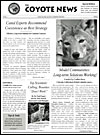 The Coyote News
The Coyote News
Read our free Coyote News Fact Sheet (.pdf file) to learn about coexistence strategies and model communities. Topics also include information on the ecological role of coyotes, and interviews with top canid biologists about why coyote culling and bounties don’t work.
Also included are myth busters facts, tips, and simple tools for coexisting with coyotes.
Click on image at right to download the current issue.
-
 COYOTE HAZING FIELD GUIDE
COYOTE HAZING FIELD GUIDE
Keeping coyotes wild and wary is the key to successful coexistence. This full-color brochure teaches you about "hazing", a powerful tool for keeping coyotes at a distance by reinforcing the coyote's natural wariness of people. Discover what hazing is, when and how to do it, and how to avoid common mistakes.
Our Coyote Hazing Field Guide is a practical and information-packed tool for use by individuals, agencies, parks and open space departments, and all community education and outreach efforts.
Contact us at info@projectcoyote.org if you would like to order our new Coyote Hazing Field Guide brochures.
Click here to download the brochure and print at home.
-
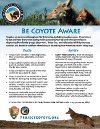 BE COYOTE AWARE educational flyer
BE COYOTE AWARE educational flyer
Designed for use by agencies, parks and open space departments, and communities, Project Coyote's new BE COYOTE AWARE flyer helps inform the public about coyotes and how to mitigate negative encounters.
Contact us at info@projectcoyote.org if you would like to use this flyer for your outreach efforts (agency logos at bottom can be tailored to your needs). Project Coyote is making this available FOR FREE as part of our ongoing effort to help expand community educational outreach efforts and promote coexistence.
Click on image at right to enlarge.
-
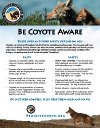 BE COYOTE AWARE educational sign
BE COYOTE AWARE educational sign
Designed for use by agencies, parks departments, and communities, in open space areas known to be inhabited by coyotes, Project Coyote’s BE COYOTE AWARE sign helps educate the public about coyotes and how to mitigate negative encounters.
Contact us at info@projectcoyote.org if you would like to use this sign for your outreach efforts (agency logos at bottom can be tailored to your needs). Project Coyote is making this available FOR FREE as part of our ongoing effort to help expand community educational outreach efforts.
Click on image at right to enlarge.
-
 Educational Tips Cards
Educational Tips Cards
Project Coyote’s laminated and colorful tips cards provide tips on how to coexist with coyotes and mitigate conflicts. Contact us at info@projectcoyote.org if you would like to order tips cards.
Click on image at right to enlarge.
-
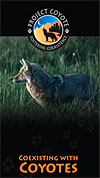 COEXISTING WITH COYOTES brochure
COEXISTING WITH COYOTES brochure
A comprehensive five-panel full-color brochure, Project Coyote’s new educational outreach tool includes information about coyote ecology, biology, and ways to mitigate negative encounters with coyotes in both urban and rural environments. Considered one of the best coyote brochures available, several agencies and communities have started to use this brochure in their educational outreach efforts.
Contact us at info@projectcoyote.org if you would like to order brochures.
Click here for brochure.
-
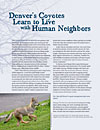 Denver’s Coyotes Learn to Live with Human Neighbors
Denver’s Coyotes Learn to Live with Human Neighbors
Camilla Fox interviews Ashley DeLaup, Wildlife Ecologist from the City and County of Denver, AWI Quarterly, Summer 2010.
Learn about how the city and county of Denver has become a model trend-setter by adopting and implementing proactive coexistence policies and practices to help people and coyotes better cohabitate.
Click on image at right to download.
COYOTE CHRONICLES NEWSLETTER
 Welcome back to Coyote Chronicles Welcome back to Coyote Chronicles
At the heart of coexistence is a healthy relationship. Anyone who has ever tried to improve a relationship knows that these values are important:
- Mutual respect
- Fairness
- Empathy
In this Valentine's Day issue of Coyote Chronicles, we'd like to share the many ways we're working - and succeeding - in improving the relationship between people and coyotes (and other wildlfie) by promoting the values that support it. Read about our hard work with the Sierra Club to create a national policy against cruel trapping and our efforts to help restrict traps that indiscriminately kill wildlife. Meet our newest Southern California representative, Randi Feilich, who helped her community stop taxpayer funded coyote trapping and adopt one of the most coyote friendly management plans in the country and a model for others to follow.
Featured in this month's Los Angeles Magazine, Anne Taylor Fleming writes about our relationship with coyotes in Southern California in Call of the Wild. Read her thoughtful words and consider your own relationship with coyotes and other urban wildlife. Read on....
- November 2011 Coyote Chronicles
- August 2011 Coyote Chronicles
- February 2011 Coyote Chronicles
- September 2010 Coyote Chronicles
FILMS
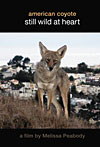 American Coyote — Still Wild at Heart (30 minutes, Color, 2008) American Coyote — Still Wild at Heart (30 minutes, Color, 2008)
This compelling documentary produced and directed by San-Francisco based filmmaker, Melissa Peabody, founder of Living World Films, is a virtual case study of the coyote’s natural range expansion continent-wide. While the film unfolds with the return of coyotes to the San Francisco Bay area, it pursues the coyote’s story across the North American landscape —from Northern California to New York City's Central Park to Chicago, and points in between. Through interviews with coyote researchers, ecologists, and experts,- including Project Coyote Founding Director, Camilla Fox -- viewers learn about the remarkable adaptability and intelligence of this successful native carnivore and the challenges and opportunities coyotes provide to both urban and rural communities. (Note: As a special promotion, Project Coyote is providing a free copy of American Coyote — Still Wild at Heart for all tax-deductible donations of $100 or more — as well as a free one year subscription to the award-winning Earth Island Journal. To order visit our donation page.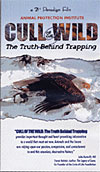 Cull of the Wild: The Truth Behind Trapping (includes both a 27 min. and 10 min. version, Color, 2002) Cull of the Wild: The Truth Behind Trapping (includes both a 27 min. and 10 min. version, Color, 2002)
Produced by Project Coyote founding director, Camilla Fox, in partnership with 21st Paradigm, CULL OF THE WILD: The Truth Behind Trapping, exposes the inherent cruelty of body-gripping traps and snares and challenges the claim that trapping with non-selective traps is an effective wildlife management tool. Featuring new and archival footage and exclusive interviews with trappers, biologists, veterinarians, members of Congress, and wildlife advocates, CULL OF THE WILD educates viewers about the effects of trapping on wildlife and presents a stark picture of the realities of the fur trade and of federal predator control trapping programs. More information.
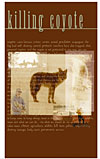 Killing Coyote (83 min., Color/B&W, 2000) Killing Coyote (83 min., Color/B&W, 2000)
This documentary feature from High Plains Films explores the relationship between people and coyotes in the American West. Killing Coyote, which won the John Michaels Award at the 23rd Big Muddy Film Festival in 2001, was shot in five western states. “Killing Coyote is really not a ‘wildlife’ film,” says film director Doug Hawes-Davis. “Our movies focus on the relationship between nature and society; and this troubled relationship is epitomized by the incredible efforts that society puts into killing coyotes.” The movie was filmed by Hawes-Davis and accomplished cinematographers Dru Carr of Missoula and Franz Camenzind of Jackson, Wyoming. More information
To order a copy of the film (in DVD format that includes four versions of the film -83, 57,28 and 19 minutes) contact Project Coyote at info@projectcoyote.org- On Nature’s Terms (25 min., Color, 2001)
Using dramatic footage and inspirational stories, including an interview with Project Coyote Founding Director, Camilla Fox, On Nature's Terms illustrate how ordinary citizens in both rural and urban America are doing their part to co-exist in harmony with carnivores- and the challenges of carnivore conservation. Produced by award winning film producer John de Graaf, this ground-breaking 25 minute film makes the important connection between the ecological, economic, and social factors for carnivore conservation and the necessity of protecting the large connected expanses of land that they need to survive. For more information: contact Sharon Negri at snegri@igc.org or visit earthislandprojects.org.
EDUCATIONAL CURRICULA
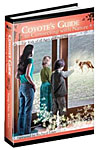 Coyote’s Guide to Connecting with Nature: For Kids of all Ages and their Mentors, Wilderness Awareness School & Owlink Media 2008. Written by Jon Young, Ellen Haas, and Even McGown, this new book offers powerful mentoring strategies for building lasting connections with nature-- emulating the curiosity, intelligence, and adaptability of the coyote. Joseph Cornell, world-renowned author and environmental educator, says of Coyote's Guide, "This book has the power to change lives..." More information. Coyote’s Guide to Connecting with Nature: For Kids of all Ages and their Mentors, Wilderness Awareness School & Owlink Media 2008. Written by Jon Young, Ellen Haas, and Even McGown, this new book offers powerful mentoring strategies for building lasting connections with nature-- emulating the curiosity, intelligence, and adaptability of the coyote. Joseph Cornell, world-renowned author and environmental educator, says of Coyote's Guide, "This book has the power to change lives..." More information.
BOOKS & OTHER PUBLICATIONS BY PROJECT COYOTE STAFF & ADVISORY BOARD MEMBERS
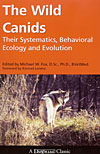 The Wild Canids: Their Systematics, Behavioral Ecology and Evolution (first published 1975; reprinted in 2009) - SPECIAL LIMITED EDITION AVAILABLE AS DONATION BONUS! The Wild Canids: Their Systematics, Behavioral Ecology and Evolution (first published 1975; reprinted in 2009) - SPECIAL LIMITED EDITION AVAILABLE AS DONATION BONUS!
Edited by Michael W. Fox
Edited by Dr. Michael W. Fox, Project Coyote Advisory Board member and one of the premier researchers in the field, The Wild Canids includes 30 scholarly studies in the field of wild canid ethology. First published in 1975, our knowledge of the behavior and evolution of wolves, foxes, coyotes, and Canis familiaris—the domestic dog—was extremely limited until the publication this acclaimed volume, which represented a major step forward in understanding these fascinating animals. It also laid out a number of areas of inquiry that stimulated further study. In the nearly 35 years since its publication, The Wild Canids has been a valuable resource for conservationists in protecting and re-introducing canids into the wild and in familiarizing dog trainers and behaviorists with the science of canine behavior. Today’s readers now have the opportunity to delve into the original research by such pioneers in the field as Bekoff, Belyaev, Zimen and many more. Limited signed edition available as donation bonus; for more information click here.
Jacket blurb written by Project Coyote Advisory Board member Marc Bekoff:
“The Wild Canids is an excellent source for anyone who wants to know about the behavior, ecology, and conservation of these amazing animals. Much of the information is as important as it was when the book was first published.”
~Marc Bekoff, University of Colorado; author of numerous books including The Emotional Lives of Animals, Wild Justice: The Moral Lives of Animals, and Encyclopedia of Animal Behavior
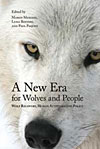 New Era for Wolves and People: Wolf Recovery, Human Attitudes, and Policy (2009) New Era for Wolves and People: Wolf Recovery, Human Attitudes, and Policy (2009)
Edited by, Marco Musiani, Luigi Boitani and Paul Paquet
A New Era for Wolves and People analyzes the crucial relationship between human ethics, attitudes, and policy and the management of wolf populations in Europe and North America. The contributors assert that these human dimensions affect wolf survival just as much, if not more, than the physical environment. Contributors include recognized scientists and other wolf experts who introduce new and sometimes controversial findings. This book features a co-authored introduction by Project Coyote Advisory Board member Paul Paquet who is also a co-editor of the book, and a chapter titled Ethical Reflections on Wolf Recovery and Conservation: A Practical Approach for Making Room for Wolves by Camilla Fox and Project Coyote Advisory Board member Marc Bekoff. To download and read a copy of this chapter, click here. More information.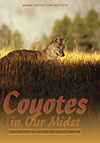 Coyotes in Our Midst: Coexisting with an Adaptable and Resilient Carnivore Coyotes in Our Midst: Coexisting with an Adaptable and Resilient Carnivore
By Project Coyote founding Executive Director Camilla H Fox and Christopher Papouchis
Coyotes in Our Midst: Coexisting with an Adaptable and Resilient Carnivore discusses the wide array of practical and proven humane and ecologically sound techniques available to ranchers and suburbanites for coexisting with coyotes — from livestock guard dogs, shepherds, and state of the art fencing, to propane exploders, noise makers, and “Coyote Rollers”. References and links are provided to enable individuals, communities, municipalities and others involved in coyote conflict abatement programs to obtain additional resources for reducing coyote conflicts.
Topics covered in Coyotes in Our Midst:
- Coyote demographics and ecology
- The role of coyotes in ecosystems
- Background history on predator management in the U.S.
- The biological and ecological impacts of lethal coyote control
- The value of community-based conservation approaches
- Urban/suburban conflicts between coyotes and people
- Methods and techniques for reducing conflicts both in rural and urban ecosystems
- State-by-state information about laws regarding coyotes ~ classification and management
- Case studies and prototype models
Coyotes in Our Midst is intended to help communities, agencies, public officials and concerned individuals resolve such conflicts with the many scientifically proven, practical management techniques available for coexisting with coyotes. To download a free PDF copy of this publication, click here. (© Born Free USA united with Animal Protection Institute). 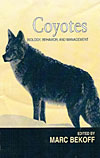 Coyotes: Biology, Behavior and Management Coyotes: Biology, Behavior and Management
By Marc Bekoff
This classic of the canid literature, originally published in 1978 and reprinted in 2001 by Blackburn Press, pulls together much disparate research in coyote evolution, taxonomy, reproduction, communication, behavioral development, population dynamics, ethology and ecological studies in the Southwest, Minnesota, Iowa, New England and Wyoming as well as studies on livestock damage and research on other canids. - Wild Justice: The Moral Lives of Animals (2009)
By Marc Bekoff and Jessica Pierce
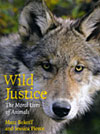 Scientists have long counseled against interpreting animal behavior in terms of human emotions, warning that such anthropomorphizing limits our ability to understand animals as they really are. Marrying years of behavioral and cognitive research with compelling and moving anecdotes, Marc Bekoff and Jessica Pierce reveal that animals exhibit a broad repertoire of moral behaviors, including fairness, empathy, trust, and reciprocity. Underlying these behaviors is a complex and nuanced range of emotions, backed by a high degree of intelligence and surprising behavioral flexibility. Animals, in short, including coyotes, are incredibly adept social beings, relying on rules of conduct to navigate intricate social networks that are essential to their survival. Ultimately, Bekoff and Pierce draw the astonishing conclusion that there is no moral gap between humans and other species: morality is an evolved trait that we unquestionably share with other social mammals. More information. Scientists have long counseled against interpreting animal behavior in terms of human emotions, warning that such anthropomorphizing limits our ability to understand animals as they really are. Marrying years of behavioral and cognitive research with compelling and moving anecdotes, Marc Bekoff and Jessica Pierce reveal that animals exhibit a broad repertoire of moral behaviors, including fairness, empathy, trust, and reciprocity. Underlying these behaviors is a complex and nuanced range of emotions, backed by a high degree of intelligence and surprising behavioral flexibility. Animals, in short, including coyotes, are incredibly adept social beings, relying on rules of conduct to navigate intricate social networks that are essential to their survival. Ultimately, Bekoff and Pierce draw the astonishing conclusion that there is no moral gap between humans and other species: morality is an evolved trait that we unquestionably share with other social mammals. More information.
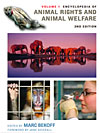 Encyclopedia of Animal Rights and Animal Welfare Second Edition (2009) Encyclopedia of Animal Rights and Animal Welfare Second Edition (2009)
Edited by Marc Bekoff, Foreword by Jane Goodall
Expanded to two volumes, the comprehensively updated new edition, Encyclopedia of Animal Rights and Animal Welfare: Second Edition is an extraordinary publishing event that encompasses the work of 150 contributors—experts from around the world that make up a virtual “who's who” in the broad areas of animal protection. It remains the only reference to cover the entire scope of animal rights and welfare from a global interdisciplinary perspective, with an international team of contributors assembled by Marc Bekoff covering animal treatment issues in the United States, China, India, Kenya, Australia, and many other nations. Includes two chapters by Camilla Fox: Predator Control & Ethics and Wildlife Trapping: Behavioral & Welfare Implications. More information. God's Dog: The North American Coyote God's Dog: The North American Coyote
by Hope Ryden
For two years naturalist/photographer Hope Ryden camped in remote areas of the West observing and photographing coyotes. With eloquence and clarity, she describes the private life of this much-maligned animal in a book that has been heralded as the classic treatise on the subject. While observing her controversial subjects, Hope endured hardships and peril, events she weaves into her beautiful story.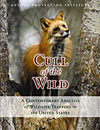 Cull of the Wild: A Contemporary Analysis of Wildlife Trapping in the United States Cull of the Wild: A Contemporary Analysis of Wildlife Trapping in the United States
Edited by Camilla H. Fox and Christopher M. Papouchis
Co-edited by, Camilla Fox, Project Coyote Founding Director, CULL OF THE WILD: A Contemporary Analysis of Trapping in the United States, is considered a key reference and primer on the history and current status of trapping in the U.S. and includes detailed information about trapping devices, practices, regulations, policy reform efforts, as well as statistics on the species and numbers of animals captured in each state. To download a free copy, click here.
What others have to say about CULL of the WILD:
“At last a book that thoughtfully and thoroughly documents the history behind the arcane and inhumane practice of fur trapping. CULL of the WILD is a very timely contribution that I believe will serve to educate the public on this particular injustice inflicted upon wildlife and help bring an end to this barbaric practice.”
~U.S. Representative Sam Farr (D-CA)
“CULL of the WILD provides important thought and heart provoking information to a world that must now act. Animals and the future are relying upon our passion, compassion, and commitment to end this senseless, destructive history.”
~Julia Butterfly Hill, Author, Legacy of Luna, & founder of the Circle of Life Foundation
“CULL of the WILD is a well researched, thoughtful, comprehensive guide for concerned citizens and activists alike. If you haven’t been moved to action before reading this book, you will be by the time you are done.”
~U.S. Representative Peter DeFazio (D-OR)
. 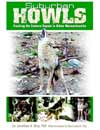 Suburban Howls Suburban Howls
By Dr. Jonathan Way (with foreword by Project Coyote Advisory Board member, Dr.Marc Bekoff)
"Here is a fabulous journey into the life of the eastern Coyote in the northeastern United States. If you’ve ever wanted to know these canine inhabitants of wild lands and rural and suburban zones better, this book is for you. Author Jonathan Way started studying coyotes when he was in high school. Suburban Howls encompasses his life and studies beginning then, and continuing through his university years to the present. He is a scientist who loves his subject, loves the very beings of his subject… The book will be of interest to students of wildlife biology, wildlife management, and of human wild life interactions and ethics. It is definitely readable for a general audience with an appreciation for adventure and a curiosity for wildlife. If you know someone (cat owner or otherwise) who could benefit from feeling more at home with their neighbouring Coyotes, you might sneak this book onto their coffee table." ~ from review of Suburban Howls by BevMcBrideE in Canadian Field Naturalist
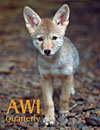 AWI Quarterly AWI Quarterly
The summer 2009 issue of the Animal Welfare Institute’s Quarterly magazine features a cover story by Camilla Fox titled Trapped in Debate about the controversy over the European Union’s efforts to restrict imports of furs from countries that still use steel-jawed leghold traps to trap coyotes and other wild animals for their fur and the U.S. government’s attempts to thwart this international regulation. Read the full article online- AWI Quarterly
 The fall 2009 issue of the Animal Welfare Institute’s Quarterly magazine features a cover story by Camilla Fox titled Carnivore Management in the U.S.: The Need for Reform about the U.S Department of Agriculture (USDA) Wildlife Services’ ongoing war against native carnivores and other wildlife at the behest of livestock ranchers and other agriculturalists. The fall 2009 issue of the Animal Welfare Institute’s Quarterly magazine features a cover story by Camilla Fox titled Carnivore Management in the U.S.: The Need for Reform about the U.S Department of Agriculture (USDA) Wildlife Services’ ongoing war against native carnivores and other wildlife at the behest of livestock ranchers and other agriculturalists.
The article provides a brief history of Congressional debates over predator management in the U.S. and current data about predators killed by the USDA. Read the full article online
 AnimalsVoice AnimalsVoice
The current 36-page issue of AnimalsVoice features a cover story by Camilla Fox about predator management in the U.S. and the ethical, ecological and economic impacts of federally and state subsidized killing of wolves, coyotes, and other native carnivores nationwide.
Also included is a separate article by Camilla about Project Coyote, the organization’s mission, history, and primary areas of focus. More information.
COYOTE/ CANID RELATED BOOK LIST
(Click Here To Download Project Coyote’s Recommended Book List as a .pdf File)
- Behavior of Wolves, Dogs, and Related Canids by Michael W. Fox. Krieger Publishing Co., Melbourne, Florida, reprint edition 1984.
- Biology and Conservation of WIld Canids, eds. D.W. MacDonald and C.
Sillero-Zubiri. Oxford UP, 2004
- Bringing Life to Ethics: Global Bioethics for a Humane Society by Michael W. Fox. State University of New York Press, Albany, New York, 2001.
- Carnivore Conservation, eds. John L. Gittlenman, Stephen M. Funk, David MacDonald and Robert K. Wayne. Cambridge UP, 2001.
- Concepts In Ethology: Animal Behavior And Bioethics by Michael W. Fox. Krieger Publishing Co., Melbourne, Florida, second edition 1998.
- Coyote, a Trickster Tale from the American Southwest by Gerald McDermott, Harcourt, Brace and Company, New York, 1994. (children’s book)
- Coyote Reader by William Bright, University of California Press, 1993.
- Coyotes: Biology, Behavior, and Management. Academic Press, by Bekoff, M. (ed.) New York. 1978. Reprinted 1990 by Academic Press and 2001 by Blackburn Press, West Caldwell, New Jersey.
- Coyotes in our Midst: Coexisting with an Adaptable and Resilient Carnivore by Camilla H. Fox and Christopher M. Papouchis. Animal Protection Institute, Sacramento, California, 2005.
- Cull of the Wild: A Contemporary Analysis of Wildlife Trapping in the United States edited by Camilla H. Fox and Christopher M. Papouchis. Animal Protection Institute, Sacramento, California, 2004.
- Don Coyote by Dayton O Hyde, Arbor House, New York, 1986.
- Eastern Coyote: The Story of its Success by Gerry R. Parker, Nimbus Publishing, Halifax, Nova Scotia, 1995.
- Giving Birth to Thunder, Sleeping with his Daughter by Barry Lopez, Avon Books, New York, 1981.
- God’s Dog by Hope Ryden (foreword by Dr. Michael W. Fox), Coward, McCann & Geoghegan, New York, 1975.
- Living with Coyotes by Stuart R. Ellins, University of Texas Press, 2005.
- Meet Tricky Coyote! by Gretchen Will Mayo, Walker and Company, New York, 1993. (children’s book)
- Noninvasive Survey Methods for Carnivores , by Robert A. Long (Editor), Paula MacKay (Editor), Justina Ray (Editor), William Zielinski (Editor). 2008. Island Press. Washington, D.C.
- People and Predators: From Conflict to Coexistence, eds. Nina Fascione, Aimee Delach and Martin E. Smith, Island Press, 2004.
- Predatory Bureaucracy, by Michael J. Robinson, University Press of Colorado, 2005.
- Suburban Howls: Tracking the Eastern Coyote in Urban Massachusetts by Jonathan G. Way (Foreword by Marc Bekoff), Dog Ear Publishing, Indianapolis, Indiana, 2007.
- Sundance Coyote by Michael W. Fox. Coward, McCann & Geoghegan, New York, 1974. (children’s book)
- The Coyote, Defiant Songdog of the West by Francois Leydet, University of Oklahoma Press, 1977.
- The Voice of the Coyote by James Frank Dobie, Little Brown, Boston, 1949.
- The Wild Canids by Michael W. Fox, Krieger Publishing Co., Melbourne, Florida, reprint edition 1983.
- The Wild Canids: Their Systematics, Behavioral Ecology and Evolution by Michael W. Fox, Van Nostrand Reinhold, New York, 1974.
- Track of the Coyote by Todd Wilkinson. North Word Press, Inc, Wisconsin, 1995.
- Whitepaws: A Coyote-Dog by Michael W. Fox. Coward, McCann & Geoghegan, New York, 1979. (children’s book)
- Wild Justice—The Moral Lives of Animals by Marc Bekoff and Jessica Pierce. The University of Chicago Press, 2009.
- Wild Neighbors: The Humane Approach to Living with Wildlife by John Hadidian, Margaret Baird, Maggie Brasted, Lauren Nolfo-Clements, Dave Pauli, and Laura Simon. Humane Society Press, Washington, D.C. 2007.
Links
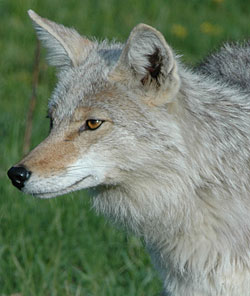 A cornerstone of Project Coyote is the belief that success in fostering coexistence between people and wildlife depends upon collaborative efforts and partnerships. A cornerstone of Project Coyote is the belief that success in fostering coexistence between people and wildlife depends upon collaborative efforts and partnerships.
This support and collaboration comes in a variety of forms from photographers and web designers contributing their work, to filmmakers and writers featuring our work on behalf of coyotes and other wildlife, to individual donations, event sponsorship, and foundations. Please visit the links below to learn about our colleagues, supporters, friends and those who have inspired us.
LINKS
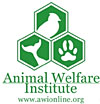  Animal Welfare Institute Animal Welfare Institute
Through its unique Christine Stevens Wildlife Award grant program, the Animal Welfare Institute stimulates and supports research efforts to discover new techniques, test existing products, and devise new strategies to humanely resolve or reduce wildlife conflicts and to develop non-invasive wildlife research methodologies (accepts annual applications for grants up to $10K; see website for details). (Project Coyote founding director, Camilla Fox, was awarded the CSWA award in 2006 which supported her Master’s thesis research that examined a unique and innovative non-lethal livestock and wildlife protection program in Marin County, California; see- AWI Christine Stevens Wildlife Award Recipient: Camilla Fox
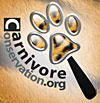  CarnivoreConservation.org CarnivoreConservation.org
Carnivore Ecology & Conservation provides a comprehensive database of resources about carnivores including regularly updated news, a searchable literature database, future meeting details and proceedings of past ones, and more. (Note: Project Coyote thanks CarnivoreConservation.org for sharing their coyote database with us; our new database will be accessible soon on our website!).
  Human Wildlife Conflict Collaboration Human Wildlife Conflict Collaboration
The Human-Wildlife Conflict Collaboration (HWCC) is a global partnership of over 70 organizations and institutions supporting greater inter-disciplinary and multi-sector collaboration on Human-Wildlife Conflict. HWCC is unique in that it provides a neutral global forum upon which to convene the individuals, institutions and sectors working on or affected by conflict in conservation. Through this forum, HWCC’s innovative deep-rooted conflict resolving trainings and interventions, and our collaborative work, HWCC helps wildlife professionals and key decision makers shift our efforts from a reactive mitigation of human-wildlife conflict to a proactive, prevention of all conservation conflicts. Project Coyote’s founding director, Camilla Fox, serves on HWCC’s Steering Committee.
  Predator Friendly Predator Friendly
Predator Friendly certifies farms and ranches that use humane practices to keep livestock safe and wildlife alive to let consumers know about farms practicing wildlife stewardship. Through pasture management strategies, guardian animals such as dogs and llamas, and vigilant observation, Predator Friendly producers coexist with coyotes, bears, mountain lions and other wild animals.
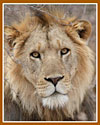  The Carnivore Coexistence Lab The Carnivore Coexistence Lab
“We envision a balance between human needs and carnivore conservation worldwide. To attain this vision, we create knowledge about human-carnivore coexistence through interdisciplinary research around the world. We apply that knowledge to solve current conservation problems. We share our findings with audiences worldwide." Read our applied research on coexisting with carnivores.
CREDITS
We thank the following foundations for their generous support of our work:
Leonard X. Bosack and Bette M. Kruger Charitable Foundation
We thank the following photographers for sharing their beautiful images with us:
Bill Beaudin
Sarah Bexel
Trish Carney
Chris Clarke
Camilla Fox
John Harrison
Kees Hollemans
Janet Kessler
Jim Robertson
Dianne Wittner
WildCare

|
 |


 A cornerstone of Project Coyote is the belief that success in fostering coexistence between people and wildlife depends upon collaborative efforts and partnerships.
A cornerstone of Project Coyote is the belief that success in fostering coexistence between people and wildlife depends upon collaborative efforts and partnerships.
